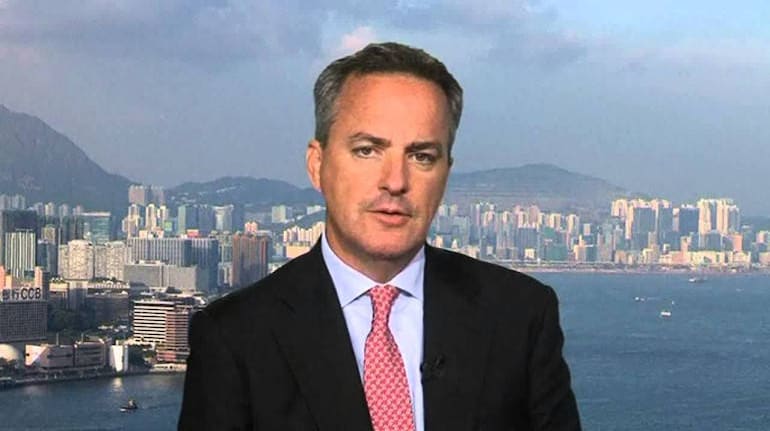



Indian banks were on a roll in 2022. Both private and public sector banks were the cynosure of the markets as they emerged as the star performers last year. The cherry on the cake was the stellar performance by both private and public sector lenders in the third quarter. It was a blissful quarter marked by stellar profit growth, healthy asset quality and record margins.
However, the sizzling rally of the previous year has lost steam and it hasn’t been all hunky dory for banking stocks in 2023. Even though market experts swear by banking as a theme for long-term portfolios, there is no denying the fact that the deep undervaluation in the sector has been bridged and stocks no longer look cheap.
Indian financials bucking the trend
Not surprising then that Adrian Mowat, Chief Asian and Emerging Markets Equity Strategist, is not batting for Indian financials at the current juncture, even though he admits that they are bucking the trend at a time when there's a broader concern about global financials. Mowat, a veteran equity strategist for emerging markets particularly India, was speaking with Moneycontrol’s N Mahalakshmi.
He believes that even though the Silver Valley Bank has spooked the US financial system, larger banks like JPMorgan, Bank of America, Morgan Stanley etc., don’t have specific issues and have been able to manage their duration risk quite well. Therefore, he adds, even though there is no fundamental issue with the Indian financial system, he would find better opportunities in US financials on a relative basis.
“Indian financials look relatively expensive versus these large benchmark financials. So I am not suggesting India has a specific fundamental issue. It's just on a relative basis. I might have better opportunities there,” he said.
Also Read: India does not have to raise its policy rates in tandem with US rates: Adrian Mowat
Not right to compare SVB collapse with the global financial crisis
The global financial system has been rocked by the Silicon Valley Bank crisis in a grim reminder of the 2008-like crisis that brought many a US banks down on their knees.
The likes of Washington Mutual, Bear Stearns & Lehman Brothers, which were considered iconic, collapsed as the credit crisis erupted in August 2007. But this time, experts say, it’s more of an idiosyncratic failure than a systemic problem. The reason is the extraordinary measures announced by the US federal authorities to shield depositors and shore up confidence in America’s financial system.
The culprit this time is the unprecedented rise in interest rates from a near-zero level to as high as 5 percent, not excessive risk-taking by financial institutions or even an asset-liability mismatch. The pre-conditions of the global financial crisis were more complex in nature. But the question is: is it large enough to culminate into a ‘perfect storm’ for the US financial system?
“The good news is that the information is there. We know the price of the securities. The problem when you go back to the Lehman crisis was we didn't know if there was any value in these esoteric derivatives, that were particular tranches of a mortgage, and you just didn't have the underlying information,” he said.
The speed with which the US Federal Reserve acted in the case of Signature Bank suggests that the central bank is on the front foot rather than on the back foot, as was the case back in 2007-08. However, Mowat feels that the bigger problem lies in the fact that the central bank is under-appreciating the impact of quantitative tightening on the economy, and how significant it really can be.
The shock of the higher interest rates is not only impacting the deposit pool in the US economy, but also pulling up effective interest rates, which is more than the move in the Fed funds target rate, he said.
“I think if we were having discussions six months from now, our focus wouldn't be so much on the type of securities, and the type of bonds banks own. It's going to be really more on how much other credit costs are rising…,” he said.
Also Read: India valuations fair amid global turmoil, says Gohil of Credit Suisse wealth
Fed must weigh impact of quantitative tightening
Mowat feels underestimating the impact of quantitative tightening would be a grave mistake and Fed Chair Jerome Powell should be talking a lot more about quantitative tightening plus the interest rates to highlight how much the central bank has already done to slow down growth to control inflation.
Disclaimer: The views and investment tips expressed by investment experts on Moneycontrol.com are their own and not those of the website or its management. Moneycontrol.com advises users to check with certified experts before taking any investment decisions.
Discover the latest Business News, Sensex, and Nifty updates. Obtain Personal Finance insights, tax queries, and expert opinions on Moneycontrol or download the Moneycontrol App to stay updated!
Find the best of Al News in one place, specially curated for you every weekend.
Stay on top of the latest tech trends and biggest startup news.